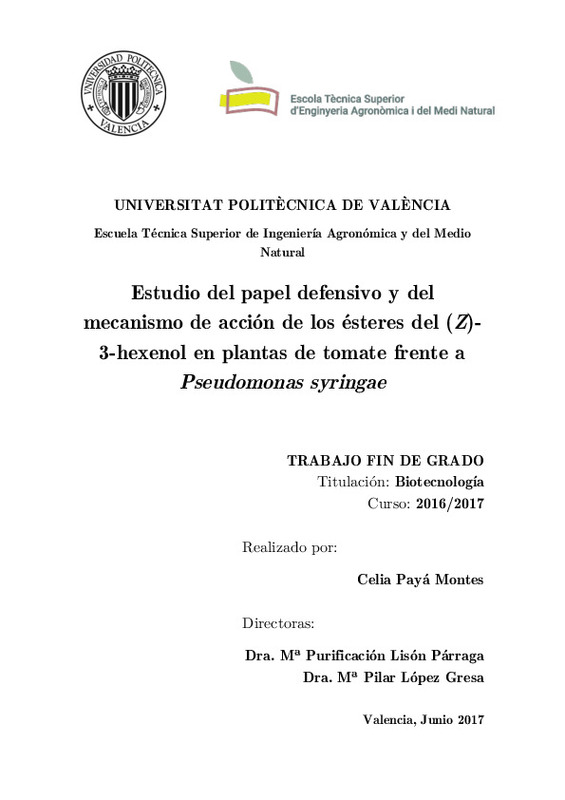|
Resumen:
|
[ES] En respuesta a las señales de estrés, las plantas sintetizan proteínas de defensa y compuestos
químicos de diversa naturaleza. Entre otros, los compuestos orgánicos volátiles
(VOCs) pertenecen a este grupo de ...[+]
[ES] En respuesta a las señales de estrés, las plantas sintetizan proteínas de defensa y compuestos
químicos de diversa naturaleza. Entre otros, los compuestos orgánicos volátiles
(VOCs) pertenecen a este grupo de compuestos defensivos (Niinemets et al., 2013).
Algunos ésteres de (Z)-3-hexenilo se encuentran inducidos diferencialmente como consecuencia
de la infección de plantas de tomate con la bacteria avirulenta Pseudomonas
syringae pv. tomato DC3000 (López-Gresa et al, en revisión).
Este proyecto trata de confirmar el papel defensivo de estos ésteres mediante el aná-
lisis de sus propiedades defensivas directas (antibacterianas y/o antioxidantes). Por otra
parte, se han analizado sus propiedades defensivas señalizadoras mediante la realización
de tratamientos exógenos con dichos VOCs y el estudio de diferentes aspectos tales como
la modificación de la resistencia o susceptibilidad, la acumulación de compuestos señalizadores
y defensivos y la inducción de proteínas defensivas, entre otros. Por último se
estudiará el posible mecanismo de acción de estos compuestos volátiles de hoja verde ante
la bacteria Pseudomonas syringae.
Nuestros estudios refuerzan la importancia de los VOCs como compuestos fundamentales
en la respuesta defensiva de las plantas frente a patógenos. Asimismo, la naturaleza
volátil de estos compuestos defensivos permitiría, como posible aplicación biotecnológica,
que plantas transgénicas que emitieran estos compuestos de manera constitutiva, pudieran
ser consideradas en sí mismas como inductoras de resistencia de sus plantas vecinas,
convirtiéndose en plantas transgénicas biofortificantes.
[-]
[EN] In response to stress signals, plants synthesize defense proteins and chemical compounds
of diverse constitution. Among others, volatile organic compounds (VOCs) belong
to this defensive compounds group (Niinemets ...[+]
[EN] In response to stress signals, plants synthesize defense proteins and chemical compounds
of diverse constitution. Among others, volatile organic compounds (VOCs) belong
to this defensive compounds group (Niinemets et al., 2013).
Some (Z)-3-hexenyl esters are dierentially
induced as a consequence of tomato plants
infection with the avirulent bacteria Pseudomonas syringae pv. tomato DC3000 (LopezGresa
et al, under review).
This project has focused on the confirmation of the defensive role of these esters by
analyzing their direct defensive properties (antibacterial and/or antioxidants). On the other
hand, their defensive signaling properties have been analyzed by means of exogenous
treatments with these VOCs and the study of dierent
aspects such as the resistance or
susceptibility modification, the accumulation of signaling and defensive compounds and
the induction of defensive proteins, among others. Finally, the possible mechanism of action
of these green leaf volatile compounds against the bacteria Pseudomonas syringae
will be studied.
Our studies reinforce the importance of VOCs as fundamental compounds in the defensive
response of plants against pathogens. Likewise, the volatile behaviour of these
defensive compounds would allow, as a possible biotechnological application, transgenic
plants to emit these compounds in a constitutive manner, being considered as resistance
inducers of their neighboring plants, becoming biofortifying transgenic plants.
[-]
|







